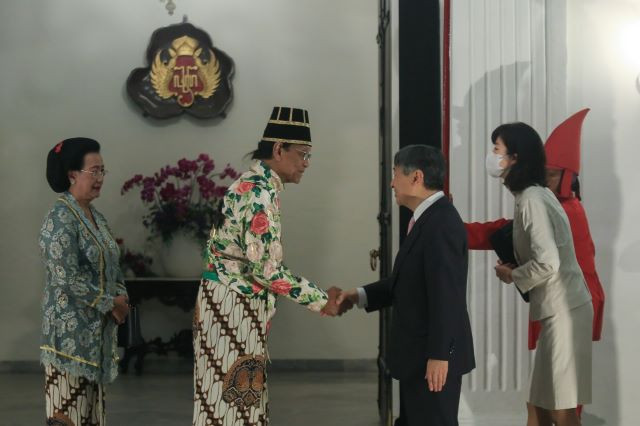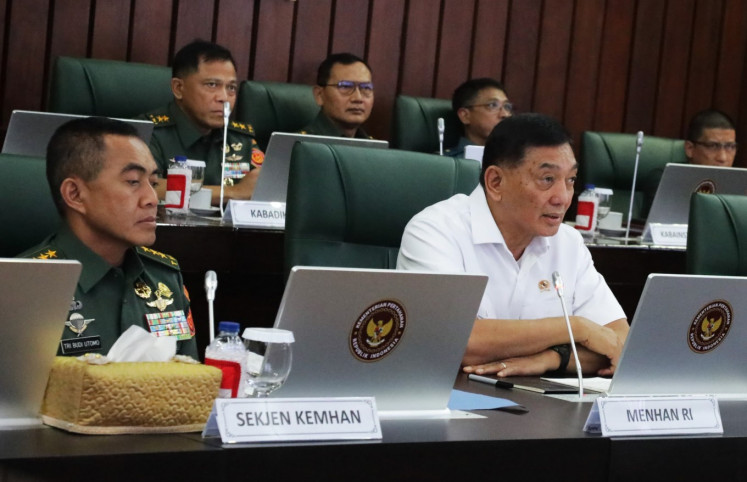Popular Reads
Top Results
Can't find what you're looking for?
View all search resultsPopular Reads
Top Results
Can't find what you're looking for?
View all search resultsEmperor Naruhito talks of the future, PM Rutte of the past
The reluctance to wholeheartedly acknowledge Aug. 17, 1945 as the Independence Day of Indonesia only shows how difficult it is for the Dutch to come to terms with the past.
Change text size
Gift Premium Articles
to Anyone
I
t is simply a coincidence that Japanese Emperor Naruhito expressed his remorse over his country's three-year occupation of Indonesia and emphasized the importance of cooperation in dealing with climate change and other global challenges on June 15, one day after Dutch Prime Minister Mark Rutte spoke in the Dutch Parliament recognizing Aug. 17, 1945 as the Independence Day of its former colony Indonesia.
Indonesians, however, wonder why the Dutch could not accept the fact that we proclaimed our independence on that date nearly eight decades ago, and they tried in vain to seize our freedom in a four-year bloody war. From their perspective, the Netherlands only agreed to withdraw from Indonesia after winning a huge ransom payment from their former colony on Dec. 7, 1949.
Two days before starting their week-long goodwill visit to Indonesia, Emperor Naruhito said he regretted the suffering of Indonesians under the rule of the Japanese military back in the early 1940s. The Allied Forces declared his grandfather Emperor Hirohito a war criminal after the end of World War II, which Japan lost.
"There was a difficult time in our relations with Indonesia," the Emperor said. "I believe it is important to not forget those who lost their lives, to deepen our understanding of history and to nurture a love of peace."
"Cooperation with emerging and developing countries is becoming increasingly important to tackle global issues such as climate change, energy and food," Emperor Naruhito told a news conference at the Imperial Palace. "I hope our friendship and mutual understanding will further deepen through exchanges and cooperation between the peoples of the two countries."
Emperor Naruhito and Empress Masako began their first Indonesian outing on June 17, bearing witness to the robust bilateral relations between the two nations.
Both Japan and the Netherlands are former colonial masters of Indonesia. The first occupied Indonesia for three-and-a-half years before Sukarno and Mohammad Hatta proclaimed the independence of Indonesia on Aug. 17, 1945. The Dutch colonized the archipelago for 350 years until 1942 when they surrendered their colony to Japanese imperial forces.
After the World War defeat in 1945, about 3,000 Japanese soldiers helped Indonesia fight the Dutch, who received support from the Allied forces. Dozens of Japanese soldiers were buried at the Kalibata Heroes Cemetery in South Jakarta.
The independence struggle ended at the Round Table Conference in The Hague in 1949, which resulted in the Dutch “transfer of sovereignty” to the United States of Indonesia (RIS). In exchange, Indonesia had to pay 4.5 billion guilders of Dutch East Indies government debt. At today's currency rate, it would amount to US$13.9 billion.
Originally, The Hague had demanded 6.5 billion guilders. Isn't it ridiculous? A former colonial master received reparations from a nation it had exploited and oppressed for 350 years.
In a parliamentary meeting last week, Rutte said Amsterdam "completely and unconditionally" acknowledged 1945 as the year marking Jakarta's independence, adding that he would soon consult with President Joko "Jokowi" Widodo to mull on a shared understanding on the past event.
"We fully acknowledge Aug. 17 without reservations. [...] We see the [1945] proclamation as a historical fact," said Rutte. But he quickly made a disclaimer, insisting that his statement would not "change any existing legal grounds." We call it a Dutch treat!
President Jokowi only gave a normative response to Rutte’s remarks. "Yes, this [statement] is good, but we will respond to it later. I would like to first ask for input from the foreign minister since the statement has a far-reaching impact," Jokowi said.
Jokowi simply nodded his head when visiting Dutch King Willem-Alexander said his country recognized Indonesia's version of Independence Day, in March 2020. The President smiled when the King apologized for the atrocities "especially those who fell during the Indonesian War of Independence [1945 to 1949]". How about the gross human rights violations the Dutch committed in the archipelago for 350 years?
The King's grandmother, Queen Juliana, and grandfather, Prince Bernhard, surprisingly received a warm welcome from a huge crowd when visiting Indonesia in 1971. She pretended she did not know Indonesia was an independent state.
When Indonesia celebrated its 50th anniversary of independence in 1995, the King's mother, Queen Beatrix, intentionally came to Jakarta four days after Independence Day, on Aug. 21. In her speech, she said: "Several days ago [...] Indonesia commemorated the independence proclamation announced 50 years ago on Aug. 17, 1945 [...] Since then, Aug. 17 has become your national day.”
Japan occupied Indonesia only for over three years, but their cruelty and brutality was no less horrifying than that of the Dutch. Japan and Indonesia signed a peace treaty in 1958. At that time, Tokyo agreed to pay war reparations worth more than 80 billion yen or $223 million. This year, the two countries commemorate their 65th anniversary of diplomatic relations.
The Dutch were very smart and proactive (aggressive) when they were the victims. In March 1956, the government of Japan "tendered the amount of 10 million dollars 'voluntarily' to the government of the Netherlands to express sincere remorse and regret for the irreparable pain suffered by the Dutch."
In 1963, West Germany paid 280 million German marks to the Netherlands as war reparation for the people's suffering caused by the Germans during World War II.
The Dutch did not do the same to Indonesians who fell victims to their atrocities. The Dutch paid compensation to families of victims of a massacre the Dutch troops committed in Rawagede village in Karawang, West Java, in 1947 only after a court battle.
For me, the reluctance to wholeheartedly acknowledge Aug. 17, 1945 as the Independence Day of Indonesia only shows how difficult it is for the Dutch to come to terms with the past. Some of them may find it so hard to see Indonesia, their former colony, progress so much that they campaign against Indonesia’s palm oil industry as the number one threat to the world’s environment.
How about Japan? The world's third-largest economy will remain one of our strategic partners in various fields, ranging from economy and trade to the advancement of democracy.
***
The writer is a senior editor at The Jakarta Post.











